Dr. Charleston announced the 2023 Outstanding Women of Color Honorees on Wednesday, November 15 at the Diversity Forum. A reception to celebrate the honorees will be held on Thursday, March 7, 2024 from 5–7:30 p.m. in Varsity Hall at Union South.
Cannot attend in-person? View the live stream on March 7.
This year’s six honorees are.
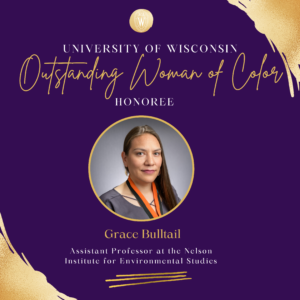
Grace Bulltail, Assistant Professor at the Nelson Institute for Environmental Studies
Dr. Grace Bulltail is originally from Montana; she is a member of the Crow Tribe and a descendant of the Mandan, Hidatsa, and Arikara Tribes of Fort Berthold, North Dakota. She is currently an assistant professor in the Nelson Institute for Environmental Studies at the University of Wisconsin–Madison.
Dr. Bulltail was raised by her paternal grandparents Clara and Joseph Bulltail, who primarily spoke the Crow language in their household. She was given her Crow name that translates to “Accomplishes many things on her own” by her great-grandmother Winona Yellowtail. The name belonged to her great-great-grandmother Clara Spotted Horse who was a graduate of Carlisle Indian School, an infamous boarding school in Pennsylvania. Dr. Bulltail is a direct descendant of Robert Yellowtail, a graduate of Sherman Indian School in Riverside, California, who was a fierce advocate of Tribal self-determination, and of Chief Plenty Coups, the last chief of the Crow Tribe.
Dr. Bulltail was particularly inspired by her late grandmother Clara’s determination to complete a college degree at the Institute of American Indian Art in Santa Fe, New Mexico while also raising the young Grace and her siblings. Leaving home at 14-years-old to attend boarding school at St. Paul’s School in Concord, New Hampshire, Dr. Bulltail became the first Native American female to graduate from the school. That experience prepared her to pursue an undergraduate engineering degree at Stanford University, where she was a student athlete as a member of the rowing team.
Dr. Bulltail worked as an engineer before returning to graduate school, earning master’s degrees from Montana Tech and Columbia University, and later served as an engineering instructor at United Tribes Technical College. She is driven to increase capacity for Tribal communities, built on her background serving as a water resources engineer for the Crow Tribe implementing its historic water settlement, and for the Three Affiliate Tribes that were experiencing environmental impacts due to fracking. Dr. Bulltail completed a doctoral program in the Department of Biological & Environmental Engineering at Cornell University, where she was the first Native American to earn a doctorate in engineering. Her research interests include water resource management, water policy, Tribal sovereignty, and watershed impacts from natural resource development.
In addition to her other work, Dr. Bulltail advocates for justice for Missing and Murdered Indigenous Women (MMIW), serving on advisory committees for organizations supporting families and victims. She was appointed to the Not Invisible Act Commission in 2022 as a non-federal commissioner charged with addressing the crises of Missing & Murdered Indigenous People and human trafficking in Indian Country. She was elected to serve two terms as a member of the American Indian Science & Engineering Society’s board of directors and is a professional engineer licensed in the state of California. Dr. Bulltail and her husband Levi, an enrolled member of the Tuscarora Nation, enjoy traveling with their daughter Georgia to their homelands in Montana and New York.
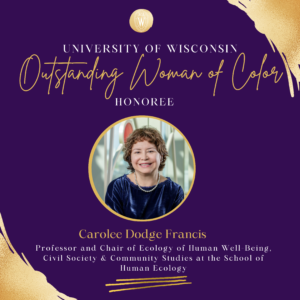
Carolee Dodge Francis, Professor and Chair of Ecology of Human Well-Being, Civil Society & Community Studies at the School of Human Ecology
Dr. Carolee Dodge Francis is the Ecology of Human Well-Being Professor and Chair of the Department of Civil Society and Community Studies at the University of Wisconsin–Madison. She is the first Native American (enrolled member of the Oneida Nation) woman to hold a chair position at the university.
Dr. Dodge Francis overcame barriers and biased practices that came almost derailed her educational journey as a first-generation student. Instead, these circumstances just furthered her determination to graduate and work collaboratively with Tribal communities, spending much of her professional career in the field working with Tribal Nations. Her educational background and passion for addressing health disparities for Native American people gave her the ability to enter the field of behavioral and social sciences, covering a wide range of health-equity research issues. These areas of concern regarding health disparities continue to drive and motivate her research to raise awareness, highlighting the compelling burden of disease significances, and her continued pursuit of health-disparity change and transformation among communities of color.
With a strong background in both community health and public health, Dr. Dodge Francis also saw the prospect of introducing Native American students to the fields of public health and STEM. Through various summer programs, she played a pivotal role in expanding opportunities for more than 250 Native American, Alaska Native, and Puerto Rican high school students within the realms of public health and STEM fields.
Her mentorship focus is directed toward Native American undergraduate and graduate students here at UW–Madison in varying research disciplines. Dr. Dodge Francis also is sought after to mentor students of color in high school and frequently supports Native American PhD students at various institutions across the country. She seamlessly incorporates cultural reflection and kinship practices, forges research partnerships, disseminates culturally responsive data collection methods, advocates for collaborative authorship of publications involving both students and faculty, and engages in cooperative efforts with Tribal communities.
In 2023 Dr. Dodge Francis received recognition as one of Wisconsin’s 33 Most Influential Native American Leaders from Madison 365, a local non-profit news outlet, and as the Outstanding Indian Elder of the Year from the Wisconsin Indian Education Association (WIEA).
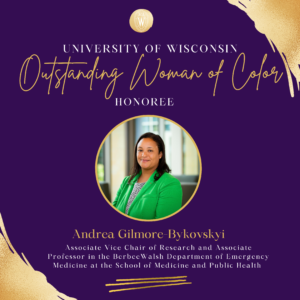
Andrea Gilmore-Bykovskyi, Associate Vice Chair of Research and Associate Professor in the BerbeeWalsh Department of Emergency Medicine at the School of Medicine and Public Health
Dr. Andrea Gilmore-Bykovskyi is an Associate Professor and Associate Vice Chair of Research in the BerbeeWalsh Department of Emergency Medicine at UW–Madison’s School of Medicine and Public Health. As a practicing geriatric nurse, Dr. Gilmore-Bykovskyi leads an NIH-funded research program focused on promoting effective, equitable and meaningful care for people living with dementia. Her commitment to this line of work first took shape during her undergraduate training at UW–Madison, where she was introduced to the nursing discipline and opportunities to pursue research through a competitive BSN-to-PhD accelerated degree program. During this formative time, she also worked as a Certified Nursing Assistant in a Skilled Nursing Facility where she saw the incredible challenges, and opportunities, that shaped care for people facing dementia – which served as a lasting anchor and inspiration for the research program she leads now.
After obtaining her PhD in 2014, Dr. Gilmore-Bykovskyi completed an Advanced Fellowship at the William S. Middleton Memorial Veterans Hospital and a Claire M. Fagin Hartford Foundation Postdoctoral Fellowship. At UW–Madison, Dr. Gilmore-Bykovskyi and her research team have led advances in dementia-focused care research that have resulted in new areas of investigation on care-delivery patterns and outcomes of importance to people living with dementia and their caregivers. Her lab has developed novel approaches for data collection and outcome assessment of clinical research, all aimed at prioritizing and incorporating real-life experiences, perspectives, and narratives of individuals at every stage of scientific research. She is currently leading the first longitudinal observational study to examine episodes of lucidity in people living with advanced dementia near end of life. In her research endeavors, Dr. Gilmore-Bykovskyi prioritizes active engagement with community and clinicians, as well as direct collaboration with individuals affected by dementia and their caregivers. This inclusive approach ensures that their perspectives and experiences are fully integrated into all stages of the research process, yielding more comprehensive and impactful results. In recognition of her national leadership in dementia care research, she was selected to co-chair the third NIA/NIH National Dementia Care and Caregiving Research Summit in 2023.
In 2017, Dr. Gilmore-Bykovskyi’s lab launched the Brain Health Equity Initiative to foster direct community investment and capacity building to facilitate healthy brain aging. This initiative leverages coalition partnerships that are responsive to community priorities and needs, with the primary purpose of promoting brain health and health equity. A cornerstone program of the initiative, Brain and Body Fitness, has been offered in the greater Madison community through these partnerships since 2019. In parallel with this initiative, Dr. Gilmore-Bykovskyi has also developed seminal frameworks to advance the practice of scientific inclusion and research equity. Across her research, she has mentored 46 trainees from a range of programs and disciplines. She is passionate about teaching research and building research infrastructure that facilitates meaningful advances in practice and care.
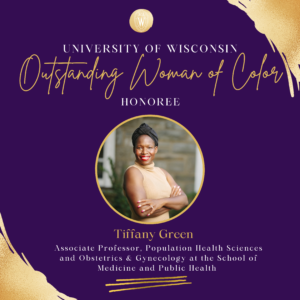
Tiffany Green, Associate Professor, Population Health Sciences and Obstetrics & Gynecology at the School of Medicine and Public Health
Dr. Tiffany Green’s one of the country’s leading health economists working in the area of reproductive health equity and maternal mortality disparities. She is passionate about the communities most affected by health inequities, which is reflected in all of her work. Dr. Green’s research is both rigorous and transformative; she works to generate evidence that can directly inform policies and lead to more equitable systems and programs to promote maternal and child health.
As the inaugural co-chair of the Black Maternal Child Health Alliance, Dr. Green works to advance policy, practice, and investment in maternal health outcomes of Black birthing people in Dane County. She serves on the Maternal Mortality Review Team of the Wisconsin Department of Health Services, which seeks to reduce and address disparities in maternal mortality across Wisconsin. Moreover, Dr. Green’s ongoing research investigates the potential impacts of Birth Cost Recovery programs on reproductive health disparities.
Dr. Green received her BA in Economics from Florida A&M University and her PhD in Economics from the University of North Carolina at Chapel Hill. She was subsequently awarded postdoctoral fellowships as a Robert Wood Johnson Foundation Health & Society Scholar and as a Health Disparities Research Scholar, both at UW–Madison. Upon completing her postdoctoral training, Dr. Green was appointed as an Assistant Professor in the Department of Health Behavior and Policy at Virginia Commonwealth University. In 2019, she was recruited back to UW–Madison and is currently an Associate Professor in the Departments of Population Health Sciences and Obstetrics and Gynecology.
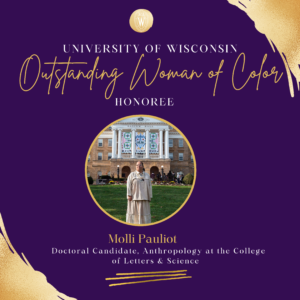
Molli Pauliot, Doctoral Candidate, Anthropology at the College of Letters & Science
Molli Pauliot, a Ho-Chunk Nation Buffalo Clan member, is a doctoral candidate in the Department of Anthropology. Ms. Pauliot and her husband Dean, a Forest County Potawatomi Bullhead clan member, have a blended family with four children: Vanessalynn, Dean Jr., Julia, and Pierson. The Pauliots have five grandchildren and are raising Ka-Rlo-Cho-Inga and Nanagwen. Ms. Pauliot is committed to Indian Child Welfare Act enforcement through social work practice, historical education, training, and programs addressing social issues while emphasizing the importance of the family kinship system in American Indian communities.
Ms. Pauliot received her BA in Sociology from Viterbo College, La Crosse, Wisconsin, in 1998. She also holds a Master of Social Work from the University of Minnesota Twin Cities as an Advanced Studies in Child Welfare Scholar. In 2003, she received the Wisconsin Indian Education Association (WIEA) Graduate Student of the Year award for her dedication to education and community involvement.
After a career addressing critical social needs in Native American communities, Ms. Pauliot returned to graduate school at UW–Madison. She completed a graduate certificate in Material Culture in 2019 and a Master’s in Anthropology in 2020. During her time at UW, she has received two fellowships: the College of Letters & Science Community of Graduate Research Scholars (CGRS) Fellowship and Graduate Fellow, Our Shared Future, Humanities Education for Anti-racism Literacy in the Science, Technology, Engineering, Mathematics, and Medicine (HEAL-STEMM). In 2021, she received the Graduate Student Service Scholarship Award for her contributions on campus.
Ms. Pauliot has been awarded numerous research grants, including from the Smithsonian Summer Institute in Museum Anthropology, UW–Madison School of Human Ecology, Cobell Foundation Graduate School Scholarship, Native Forward Scholars Fund, UW–Madison Division of Continuing Studies Returning Adult Scholarship, Newberry Consortium in American Indian Studies, Graduate Symposium at Harvard University, American Philosophical Society, and Wisconsin Arts Board Donors of Little Eagle Arts Foundation.
Ms. Pauliot’s work with Tribal and other government officials to address critical social needs has served as a model for how collaborative efforts can support Tribal sovereignty. Her research emphasizes community collaboration with the Ho-Chunk Nation through its Department of Natural Resources and with Tribal members, Little Eagle Art Foundation, Professor Tom Jones, and Indigenous black ash basket makers. Her commitment is further exemplified by her community-organizing work, such as with the first Ho-Chunk flag raising, 175th Seed by Seed banners, Ho-Chunk Artist Series, Our Shared Future events, and projects with the UW Alumni Association – all undertaken while volunteering for the Policy Advisory Board for her grandson’s Head Start Program and for Renewal Unlimited, and maintaining a Ho-Chunk cultural woman’s crafting group Hi-nuk Hosto-ra. She was elected as the 2023 graduate student representative to the American Anthropological Association Council for Museum Studies. Ms. Pauliot is also an accomplished artist and the published author of an essay about the “Ho-Chunk People of the Sacred Voice” in Tom Jones’s “Here We Stand” exhibition at the Museum of Wisconsin Art. She is currently working on an essay “History of Ho-Chunk Black Ash Baskets” to be published in June 2024.
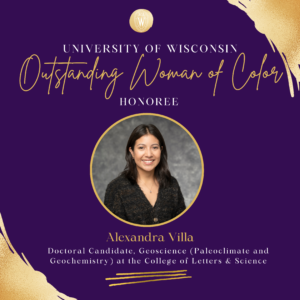
Alexandra Villa, Doctoral Candidate, Geoscience (Paleoclimate and Geochemistry) at the College of Letters & Science
Alexandra Villa is a fourth year PhD candidate in the Geoscience department at UW–Madison. She received her MS in geoscience at UW–Madison in 2020, and her BS in Geology at UCLA in 2018. Originally from Rialto, California, Ms. Villa grew up in a predominantly Latino community with her two sisters, mom, and grandma. As a daughter of immigrants, she matured at a young age to help her family and had ambitions to be successful in school to later provide for her family. Many people in her community shared similar struggles, which made her aware that the issues they faced stemmed from the conditions they were born into. At UCLA, Ms. Villa realized how unique her experience was at a top university and wondered why there weren’t more people like her in her classes. She struggled in her studies, and when she met a geology professor who took her under her wing, Ms. Villa transitioned to the geology program, began lab work, and was able to thrive.
Though she never considered geology as a profession before transitioning into the program, Ms. Villa always had an admiration for the natural things in the world. She grew up in a tectonically active area with beautiful mountains to the east and the Pacific Ocean to the west. She was always curious about her environments and how to care for them; she later realized that this was something that stemmed from her culture. Ms. Villa is trained in geology and geochemistry and studies paleoclimate and paleoceanography, the study of past climates and ocean changes. Her research interests have led her to study varying time intervals (over the last 66 million years of Earth’s history), using different archives and methods (corals, foraminifera, deep-sea sediments), across the U.S. and abroad (her most recent experience led her on a two-month voyage in the South Atlantic Ocean).
As Ms. Villa continued her studies in geology, she realized that she was fortunate to have such a supportive mentor and it was this formative experience that allowed her to gain the skills to become a skilled scientist. When she transitioned to graduate school at UW–Madison, she was faced with another reality: the isolation and hyperawareness of her identities in a STEM field were heightened while living and studying in a majority-white city and institution. This led her to find the spaces that supported her and create her own for others. From these experiences, Ms. Villa has created, developed, implemented, and showcased effective methods in creating and sustaining a more inclusive, diverse, equitable, just, and empathetic community, in her Geoscience department but also in the spaces in which she is engaged.
Ms. Villa has served as the graduate student representative on the UW–Madison Letters & Science DEI Committee since 2021. She was selected for the position following recognition of her DEI work in the Geoscience department by Dean Eric Wilcots and Associate Dean DeVon Wilson. Her leadership in DEI in the Geoscience department and the College of Letters & Science was celebrated with a 2022 Graduate Student Service Scholarship and funding for her DEI work through UW’s Women in Science and Engineering Leadership institute and the UW–Madison Department of Geoscience Kay Fowler Billings Diversity Grant.
During this period of her life, Ms. Villa finds her greatest comfort in sharing meals with her friends nearby, facetiming her family and friends who are physically distanced, painting landscapes with acrylic paint, and coming home to her dog Miel every day.